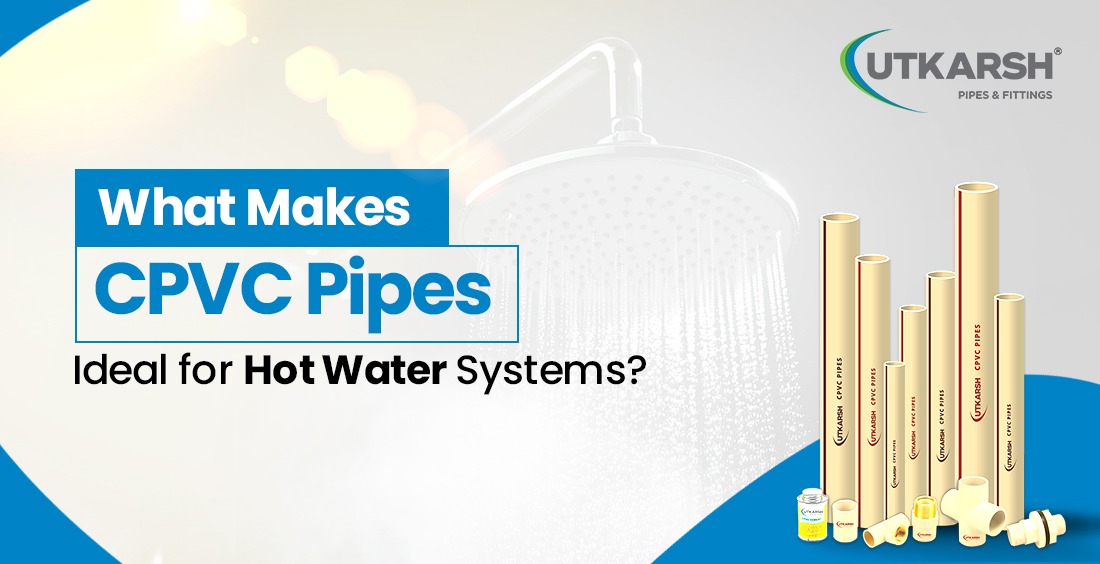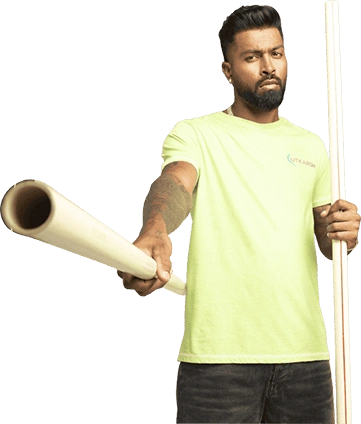What Makes cPVC Pipes Ideal for Hot Water Systems?

Hot water systems require a piping material that can handle high temperatures without losing its integrity. cPVC pipes are the answer. Known for their superior cPVC pipe heat resistance, these pipes stand out as one of the most reliable choices for delivering hot water safely and efficiently. When choosing materials for plumbing systems, it’s essential to consider factors like heat tolerance, durability, and cost-effectiveness. Here’s an in-detailed discussion into why cPVC pipes are the ideal option for hot water systems.
Check this out: Benefits of Using cPVC for Residential and Commercial Plumbing Systems
Exceptional cPVC Pipe Heat Resistance
The standout feature of cPVC pipes is their remarkable cPVC pipe heat resistance. These pipes are designed to handle temperatures up to 90°C (194°F), making them highly effective for hot water systems that require consistent heat tolerance. This high level of heat resistance ensures that cPVC pipes won’t soften, deform, or degrade even when exposed to elevated water temperatures. Their ability to withstand continuous heat exposure is one of the key reasons they’re ideal for residential and commercial hot water applications.
Improved Durability and Longevity
Due to their high cPVC thermal resistance, these pipes are known for their longevity in hot water systems. Unlike some other materials, which might degrade over time with constant exposure to heat, cPVC pipes maintain their structural integrity. The material doesn’t corrode, scale, or rust, which makes it an excellent choice for systems that require consistent performance over many years. This durability guarantees that cPVC pipes offer a cost-effective solution as they need less frequent replacement which reduces maintenance costs in the long run.
Lightweight Yet Strong
Another advantage of cPVC pipes is their lightweight nature, which makes them easy to install. Despite being lighter than metal alternatives, cPVC pipes do not compromise on strength. They have excellent tensile strength to handle internal pressures while maintaining resistance to high temperatures. This makes them reliable even in demanding hot water systems, where the pressure and heat combined could cause other materials to fail.
Corrosion Resistance for Hot Water Applications
One of the most significant benefits of using cPVC pipes is their resistance to corrosion. In traditional metal piping systems, heat and water can cause oxidation, leading to rust and deterioration. With cPVC pipes, the risk of corrosion is eliminated, even in hot water systems. This corrosion resistance makes them perfect for areas with hard water, which can accelerate corrosion in metal pipes. The cPVC pipe heat resistance ensures that your hot water system will remain safe and efficient for years to come.
Want to know- How CPVC Pipes Help in Reducing Water Wastage and Leakages?
Eco-Friendly and Safe
While many materials leach harmful substances when exposed to heat, cPVC pipes are a safer choice for hot water applications. These pipes do not release toxic chemicals, safeguarding your water for consumption. Additionally, cPVC is a more environmentally friendly option compared to metals and some plastics, as it is fully recyclable. Using cPVC pipes and fittings in your hot water system helps promote sustainability without sacrificing quality or performance.
Cost-Effective Solution
When compared to alternatives like copper pipes or stainless steel, cPVC pipes come at a significantly lower cost. Despite being cost-effective, cPVC thermal resistance ensures they perform at par with more expensive materials. Their longevity and low maintenance requirements further add to the savings, making cPVC pipes a smart investment for both residential and commercial applications.
At Utkarsh Pipes & Fittings, we provide top-quality cPVC pipes and fittings that meet the highest standards in the global market. Our range of cPVC pipes and fittings is designed to cater to various applications, ensuring reliability and durability in every installation. With maximum service temperatures between 82°C to 90°C, our cPVC pipes offer excellent heat resistance, ideal for hot and cold water applications. We adhere to stringent water safety standards, ensuring that our products deliver the highest level of performance and safety.
The Hot Choice for Hot Water
cPVC pipes are a go-to choice for hot water systems, thanks to their cPVC pipe heat resistance, durability, and cost-effectiveness. Whether you're installing a residential hot water system or managing a commercial project, cPVC pipes offer the perfect balance of performance and value. Their ability to withstand high temperatures, coupled with their lightweight, corrosion-resistant nature, ensures that your hot water system remains efficient and reliable for years to come. By choosing cPVC pipes, you're making a smart, long-term investment in your piping system.
FAQs:
What are the advantages of CPVC pipes?
They are lightweight and can be easily cut, joined, and secured using solvent cement, making the installation process quicker and more efficient.
How many years is CPVC good for?
CPVC pipes can last up to 50 years with proper installation and usage.
Is CPVC IPS or CTS?
CPVC is available in both IPS (Iron Pipe Size) and CTS (Copper Tube Size), depending on the application.
What is the full name of CPVC?
The full name of CPVC is Chlorinated Polyvinyl Chloride.











